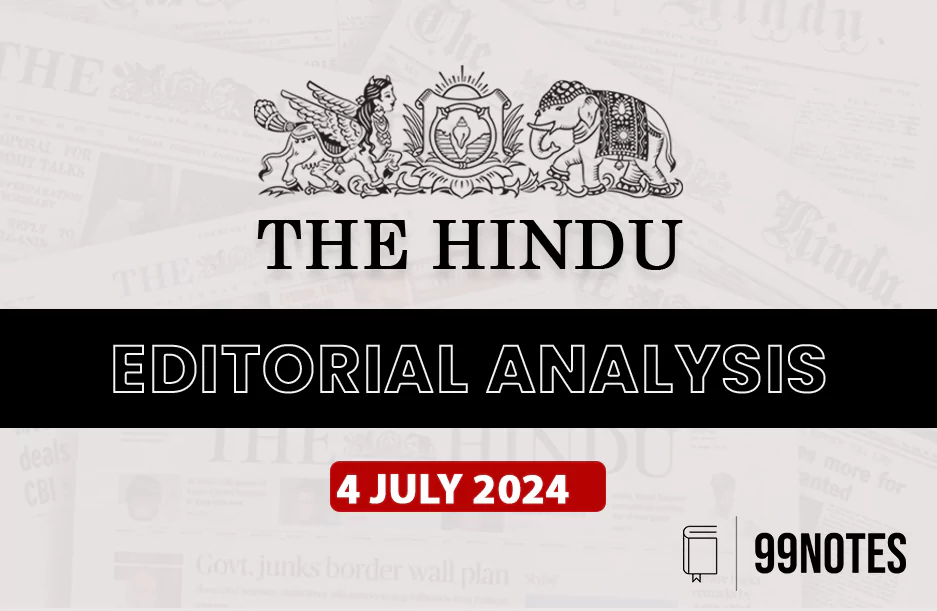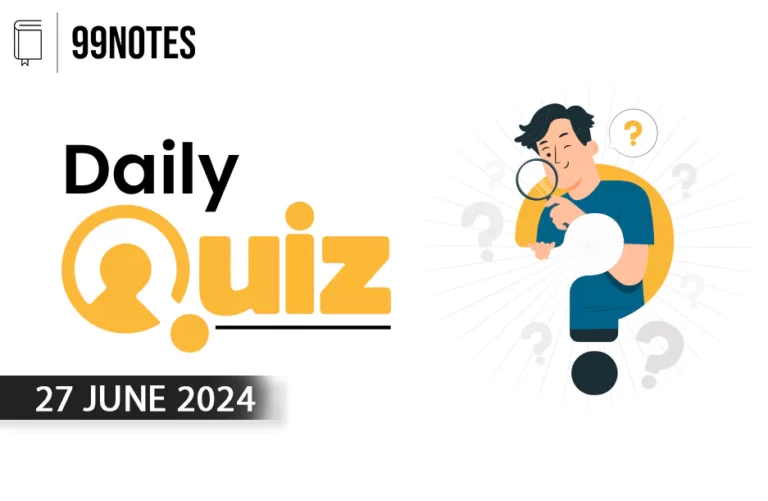4 July 2024 : The Hindu Editorial Analysis
1. Trials, medical ethics and the orbit of power
(Source – The Hindu, International Edition – Page No. – 8)
| Topic: GS2 – Social Justice – Health |
| Context |
|
Ethical Challenges in Medical Research
- Medical research plays a crucial role in advancing healthcare, but it also presents significant ethical challenges that must be addressed to ensure the welfare of participants and uphold scientific integrity.
Here’s a holistic overview of these challenges:
Informed Consent and Vulnerable Populations:
- Issue: Ensuring informed consent remains a cornerstone, yet vulnerable populations often face challenges in understanding risks and benefits.
- Example: Allegations in the Covaxin trial highlighted issues of inadequate consent procedures and enrollment of vulnerable groups without sufficient protection.
Transparency and Data Integrity:
- Issue: Transparency in clinical trial data and publication of results are critical for scientific scrutiny and public trust.
- Example: Legal petitions in India underscored the need for transparent reporting of trial data, contrasting with regulatory ambiguities.
Whistleblower Protection and Ethical Dissent:
- Issue: Whistleblowers play a vital role in exposing ethical breaches, but inadequate legal protections can deter reporting.
- Example: Carl Elliott’s work emphasizes the personal and professional risks faced by whistleblowers in challenging unethical practices.
Regulatory Framework and Oversight:
- Issue: Effective regulation is essential to monitor compliance with ethical standards, yet regulatory frameworks may be insufficient or inconsistently applied.
- Example: Criticism of India’s regulatory bodies, like the Central Drugs Standard Control Organization, for gaps in oversight and enforcement.
Industry Practices and Conflicts of Interest:
- Issue: Industry influence and conflicts of interest can compromise ethical standards and research integrity.
- Example: Instances where pharmaceutical companies prioritize commercial interests over participant safety or ethical guidelines.
Cultural and Societal Factors:
- Issue: Cultural norms and societal attitudes towards medical research can influence ethical decision-making and participant recruitment.
- Example: Studies in developing countries often face criticism for exploiting socio-economic vulnerabilities and inadequate healthcare infrastructure.
Ethics Committee Functionality and Accountability:
- Issue: Institutional ethics committees are tasked with safeguarding participant rights, but their effectiveness varies widely.
- Example: Reports from the Clinical Trials Registry–India reveal instances of non-functional ethics committees and inadequate oversight.
Way Forward: Addressing these challenges necessitates several key steps:
- Strengthening Regulatory Frameworks: Implementing clear and stringent regulations that align with international standards to ensure comprehensive oversight of clinical trials.
- Enhancing Transparency: Mandating transparent reporting of trial data and outcomes to foster accountability and trust among stakeholders.
- Improving Informed Consent Practices: Developing guidelines and training programs to enhance understanding and compliance with informed consent procedures, particularly for vulnerable populations.
- Whistleblower Protection: Enacting robust legal protections for whistleblowers to encourage reporting of ethical violations without fear of reprisal.
- Capacity Building: Enhancing the capability and independence of institutional ethics committees to effectively monitor and enforce ethical standards.
- Promoting Ethical Awareness: Educating researchers, healthcare professionals, and the public about ethical principles and their importance in medical research.
By implementing these measures, India can foster a culture of ethical conduct in medical research, ensuring participant safety, scientific integrity, and public confidence in healthcare innovation. These steps are essential for advancing the field while upholding ethical standards crucial for global health advancement.
| Practice Question: Discuss the ethical challenges in medical research in India, focusing on issues of informed consent, regulatory oversight, and the role of whistleblowers. Suggest measures to strengthen ethical practices and ensure participant protection in clinical trials. (150 Words /10 marks) |
2. Factory accidents, a pointer to rusty inspection reform
(Source – The Hindu, International Edition – Page No. – 8)
| Topic: GS2 – Governance – Government policies – Issues arising out of their design & implementation. |
| Context |
|
Background of Industrial Accidents:
- A recent explosion in a chemical factory in Dombivli MIDC caused fatalities and injuries, highlighting recurring safety lapses.
- Similar incidents were reported in 2016, 2018, 2020, and 2023, raising concerns about persistent risks in the industrial sector.
Inadequate Relocation Efforts:
- Despite a decision in 2022 to relocate 156 chemical factories from Dombivli MIDC to Patalganga, no action was taken, exacerbating safety risks.
- The unregistered status of the factory’s boiler further underscored regulatory failures and non-compliance with safety standards.
Poor Inspection Rates and Shortages:
- Maharashtra’s 2021 inspection rates revealed significant deficiencies, with only 23.89% of hazardous factories and 8.04% of registered factories inspected.
- Shortage of personnel was evident, with only 39.34% of sanctioned officers appointed, contributing to workload issues and reduced oversight.
Prosecution and Deterrence Failures:
- Low prosecution rates in Maharashtra (13.84%), Gujarat (6.95%), and Tamil Nadu (14.45%) indicated ineffective enforcement and diminished deterrent effect.
- Critics, including industry representatives, denounced the inspection system as “inspector-raj,” alleging harassment and corruption, impacting its credibility.
Reforms and Challenges in Inspection System:
- Reforms like self-certification and third-party inspections were criticised for violating International Labour Organization (ILO) standards.
- The ILO Labour Inspection Convention (081) stressed the need for qualified, independent inspectors with unrestricted access to ensure compliance with labour laws.
Need for Strengthened Governance and Accountability:
- Calls for robust reforms emphasised enhancing the inspection system’s efficiency and ethical standards.
- Governments were urged to prioritise safety over deregulation and ensure comprehensive oversight to prevent industrial disasters.
Enforcement and Accountability:
- Proposals included penalties for state failures in industrial governance, emphasising accountability beyond compensatory measures.
- The recurring nature of industrial disasters highlighted systemic shortcomings and the urgency for meaningful regulatory reforms.
Conclusion:
- Ensuring a safe working environment requires proactive governance and adherence to international standards, rather than lenient regulatory practices.
- Sustainable reforms must prioritise safety, strengthen enforcement mechanisms, and empower qualified inspectors to uphold labour laws effectively.
| Practice Question: Discuss the systemic challenges in industrial safety governance in India, focusing on regulatory failures, inadequate inspection rates, and the implications for worker safety and public welfare. Suggest measures to enhance regulatory oversight and ensure compliance with international labour standards. (250 Words /15 marks) |
3. Humility in public discourse
(Source – The Hindu, International Edition – Page No. – 9)
| Topic: GS4 – Ethics – Public/Civil service values in Ethics & Public administration |
| Context |
| The article discusses the decline of respectful public discourse post-election, highlighted by Mohan Bhagwat of RSS, emphasizing pervasive verbal aggression over substantive debate, echoing global concerns in liberal democracies. |
Introduction:
- Mohan Bhagwat, RSS chief, highlights the degradation of public discourse post-elections, emphasising the prevalence of verbal aggression over substantive discussion.
- The issue is global, affecting liberal democracies, where personal attacks overshadow genuine debate on societal issues.
Analysis of Discourse Degradation:
- Elizabeth Anderson critiques the conflation of first-order moral claims (actions) with second-order moral claims (character judgments), undermining genuine moral concerns in debates.
- Political rhetoric often resorts to personal attacks, sidelining substantive issues and fostering societal division.
Impact of Personal Attacks:
- Hate speech and personal attacks marginalise meaningful discourse, focusing instead on character assassinations rather than understanding opposing views.
- This trend hinders constructive dialogue and mutual understanding, perpetuating societal polarisation.
Lack of Humility and Understanding:
- Participants in debates often fail to acknowledge their own limitations and those of their opponents, hindering genuine dialogue and problem-solving.
- Cultivating virtues like humility and care is sidelined in favour of aggressive rhetoric and self-promotion.
Historical and Philosophical Perspectives:
- Montesquieu’s emphasis on civic education aimed at cultivating public-spiritedness and humility contrasts with contemporary political discourse lacking in these virtues.
- Dr. B.R. Ambedkar’s concerns about the quality of leaders implementing even the best constitutions highlight enduring challenges in governance.
Freedom of Speech and Intellectual Humility:
- Freedom of speech historically aimed at arriving at truth through open dialogue and criticism, contingent on humility and tolerance.
- Modern individualism challenges intellectual humility, emphasizing knowledge as power and personal achievement.
Traditional Indian Thought and Intellectual Humility:
- Indian philosophy, exemplified by Mahabharata, values character and humility in the pursuit of knowledge, contrasting with contemporary individualistic views.
- Prof. Vrinda Dalmiya’s analysis underscores the relational aspect of intellectual humility, involving empathy and openness to diverse perspectives.
Call for Reorientation:
- Bhagwat’s remarks call for a reevaluation, advocating for a return to virtues like humility and care in public discourse.
- Emphasising the moral dimensions of knowledge and discourse, Bhagwat seeks to promote a more constructive and respectful public sphere.
Conclusion:
- Addressing the degradation of public discourse requires a revival of virtues like humility and empathy, essential for fostering genuine dialogue and societal harmony.
- Bhagwat’s comments serve as a reminder of the ethical dimensions of public discourse, urging a shift towards a more inclusive and respectful approach in political and social interactions.
| Practice Question: Discuss the role of humility in fostering constructive public discourse. How can the cultivation of virtues like humility contribute to addressing the challenges of polarisation and aggression in contemporary democratic societies? (150 Words /10 marks) |




